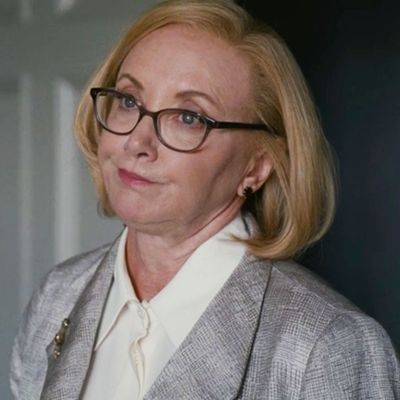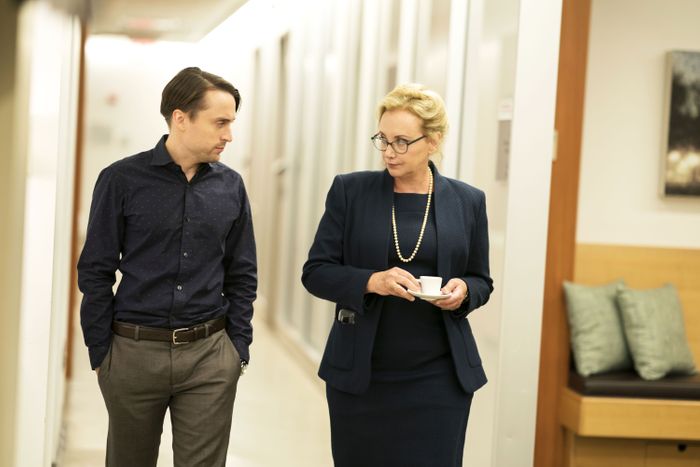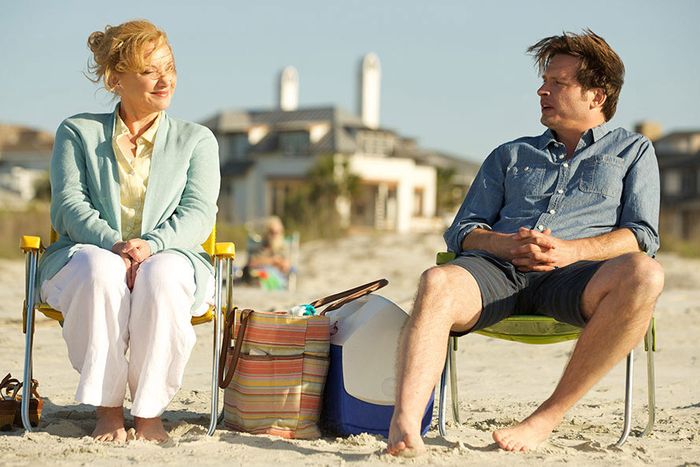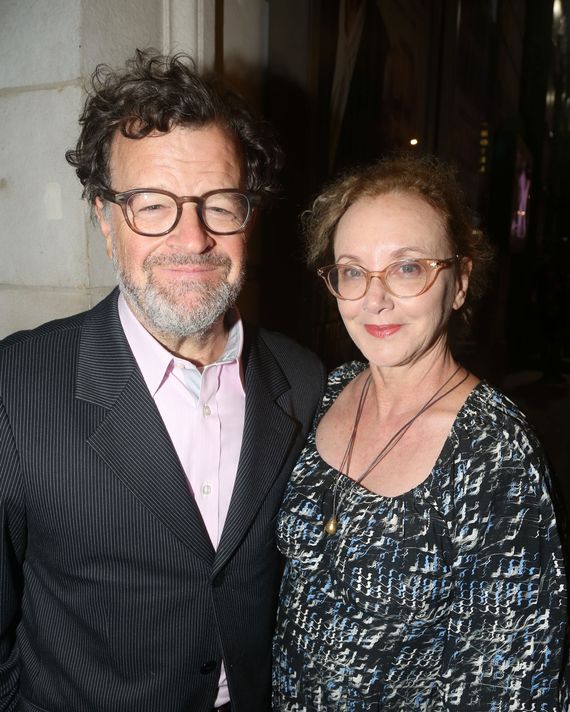
J. Smith-Cameron is enjoying a career high playing Waystar Royco corporate attorney Gerri Kellman on Jesse Armstrong’s Succession, the HBO comedy-drama that answers the question, “What if Arrested Development and King Lear had a baby?” But she’s been a memorable player in TV series and films ever since her screen debut in the 1979 indie film Gal Young Un — and even more so, an acclaimed stage actress Off Broadway and on. She became a star in regional theater scenes when she was still technically a college student (she got wrapped up in professional stage work and never graduated), landed her first Broadway role immediately after moving to New York City, and has appeared in notable theatrical productions ever since, both independent of and in collaboration with her husband, the playwright and filmmaker Kenneth Lonergan.
Vulture spoke with Smith-Cameron a few weeks ago about on Gerri’s delightfully fraught relationship with Roman Roy (Kieran Culkin), the youngest son of the Rupert Murdoch–like media baron Logan Roy (Brian Cox). But she is such a delightful interview, and she represents such a rich history of theater, film, and television with an independent spirit, that a longer follow-up was in order. We met with her recently for lunch at a restaurant in Soho, where she lives with Lonergan and their college-bound daughter, Nellie, for a conversation about her long and varied career, her work on the Sundance TV cult classic Rectify, her origins in and allegiance to theater, and the balance of art and life.
You had both feet in theater for a lot of your career, with occasional film and TV work, but now it’s heavily weighted toward screen acting. Can you walk us through the trip from there to here?
I went to high school in Greenville, South Carolina. The teacher I had got his M.F.A. from Florida State, and I was nagged into going there because he was fabulous and I was impressionable. I did Victor Nuñez’s first movie as a director, Gal Young Un, when I was still a student there. I stopped for a while to work with a children’s theater company, Actors Theater of Louisville, and I kept thinking I was going back, then I auditioned for a theater in Miami and they hired me for a whole season. I got my [Actors] Equity card. I was still supposed to be a student, so it was all a little blurry. A lot of actors go to New York and Los Angeles, but it wasn’t clear where I was supposed to go from where I was.
What did you get out of the experience of being a regional actor?
I got to play all these great leading roles! At that time, the regional theater movement was just beginning to be a big deal. People had these really groovy careers where they got to be in all of these great plays, and it didn’t matter that they lived in Minneapolis or Atlanta. That sounded sublime! But I didn’t know anybody in the field. For the most part, you had to be in the right place at the right time, be related to somebody, be fabulous-looking, or just have some kind of huge break. Those sorts of parts came wonderfully into my path during the years when I was supposed to be in college.
What lessons did you take from that phase of your life?
The big thing is that you don’t really need a degree, per se. You need the knowledge you acquired from college. Nobody’s ever asked me for my degree. Not once. A college education is worth it for the knowledge you acquire there and the contacts you make.
So, as a parent, you’re in the camp of, “Go to college to fill your brain up, and don’t get too hung up on your career.”
To some extent, yeah. I look at my daughter, Nellie, who is a high-school senior and applying in college this semester, and I am jealous of people who got to do the liberal-arts thing.
Succession is a peak in visibility for you. You’re one of those overnight successes that was decades in the making.
It’s so exciting being in it and being able to play so many scenes with Kieran.
An actor who, in addition to his other fine qualities, seems incapable of sitting on a chair or couch like a normal person.
[Laughs.] I love that about him!
How did you two develop a rapport?
You know, I was in a play with him, The Starry Messenger, with Matthew Broderick and Catalina Sandino Moreno from Maria Full of Grace. I already knew Kieran because he had done Kenny’s play This Is Our Youth years and years earlier in the West End — and then he did it again with Michael Cera on Broadway, but with Kieran playing the other part. He was in Kenny’s movie Margaret, too. So there’s a real connection between the two of us.
What do you like best about playing a major role on a popular TV show?
I felt like Gerri was a question mark when I originally auditioned. She was just supposed to be a recurring part. That was fine, but I couldn’t feel who she was as a person yet. Now, I feel like I had a hand in creating her along with the writers.
You took an active hand in that process?
I tried to, yes. It became a mission of mine last year. When the show got picked up for season one, they had to flesh out the other Waystar Royco employees. I was supposed to be in the second through sixth episodes [of season one] and maybe come back again at the very end, but I ended up getting written into every episode. I got very chuffed about that.
And then they came up with a great story line in season two with her and Roman and their relationship. There’s a sexual component, but they’re also confidants, plus there’s a maternal aspect. There’s a lot going on there!
Late in season two, Logan says he doesn’t need psychotherapy because he already knows he doesn’t want to fuck his mother. Then the camera cuts to Roman with a very complicated, uncomfortable reaction on his face. It’s a payoff for all your scenes with him up till then.
I love all of that! But I must say, given the, uh, sorts of people you see on this show, it’s fascinating how certain characters become fan favorites — if indeed Gerri is a fan favorite, as I’ve been told that she is. I’m just so tickled by that!
It’s just so different, this kind of attention. Janet on Rectify was a very important role, a substantial role. It was more central to the story than Gerri. But Succession is just a different kind of thing.
What was it like doing Rectify?
I loved playing Janet. From the very start, I got to play somebody who’s emotionally shut down, but also, right on the edge of the dam bursting. I knew a few women like that growing up in the South. One was my own mother, who has since passed away. She was not shut down, exactly — she was very ladylike and demure, very loving and grateful — but there was always a sadness about her. She hadn’t really had a chance to live her life because her life had a lot of struggle in it. Those were things that I tried to channel as I was playing Janet, the way she moved, the way she held her shoulders.
You were playing your mom?
Yeah, a little bit. Some of it just was my mom. Some of it was Rosalynn Carter! But the funny thing is, when you’re on a TV show, you don’t really know who you’re playing. At the beginning, you don’t have all the facts about your character because they don’t have all the facts about your character. On Succession next season, they could tell me, “Gerri ran away to join the circus when she was 18,” and I’d have to be like, “Okay! Let me figure out how to make this work.”
Does it bother you that there’s so much about a TV character that’s unknown?
Yeah, but only in the sense that I came up in the theater, where you have four or so weeks to mull over and rehearse the new beats and talk about it. If it’s a new play, there might be very long periods of fantastic conversations, and then you go and do it one way in front of an audience, and then you go, “Oh, this fellow’s not getting his laugh. Maybe it’s because she’s picking up the cat right then and the audience is looking there.” Once you’ve got it all down, you absorb everything as if by osmosis, and then it’s like you’re performing chamber music.
The composition is finished, but once you’ve locked it, that’s the play.
Yeah, the play is the play. If you know that a story line is going to end with a character accused of a crime being found guilty, you can shape your performance one way or another using that knowledge.
Speaking of that: On Rectify, did it bother you that for a long time, you didn’t know if your character’s son was guilty or not?
I happened to really like that. During that long time Daniel was in jail, after which he had confessed and been convicted, I think Janet had struggled with the same things Daniel struggled with, namely that he doesn’t know whether he did it because he was really drunk and really high. Amantha had him on a pedestal, but with Janet it was more like, “I will love you no matter what you did, but if you know the truth someday, I hope you will share it with me.”
I feel like Rectify, despite its subject matter, is the kind of show that inspires hope, whereas on Succession there’s no hope. Most of the characters are corrupt to the core. That’s the point.
Hope isn’t even a concept! People keep asking me, “Do you think all these [Succession characters] are bad people? Are you playing a bad person?” I don’t know what to say to that. The entire world view of the show is that these are hard, mercenary people. The rules of their universe are dog-eat-dog.
How does it affect you living in that world for months on end?
It doesn’t affect me as much as you might imagine. I’ll tell you why: Gerri is not as far gone morally or psychologically as some of the other major characters. She still has the ability to be shocked, even though she compartmentalizes that because she has to do her job. She’s horrified by certain things that the Roys demand that she do or say, but it behooves her not to object, so she rolls her eyes a lot — not commenting aloud, but commenting to the audience.
I get the impression that Gerri struggles with what is asked of her, even though it’s not for very long.
Absolutely. She’s a lawyer! Her job is to figure out, “What can we get away with?” Although, when a corporate lawyer is the character who seems to have the most conscience, what does that tell you? [Laughs.]
How did you meet your spouse and frequent collaborator, Kenneth Lonergan?
My friend the actor Patrick Breen had written a little short play. It was part of an evening of short plays. During the tech rehearsal, we got to see everybody else’s plays. One of them was a one-scene version of what would later become You Can Count on Me. The third play had an actor in it who was really sweet and funny — and it turned out to be Kenny. When I found out that same cute, funny actor had written that other play … well, I was interested.
When you’re acting in something that your husband is writing and/or directing, do you ever feel the temptation to play the spouse card and get inside information?
That tends to backfire on me. If I have a question about a scene, it’s definitely tempting to come up to him at home and ask him about it.
But you don’t?
No! Kenny felt like he couldn’t get distance between work and home that way, so I have to schedule time with him like anybody else. But I understand that. I understand how it can be uncomfortable to not have a zone of safety around work. And also, the need to prevent work from impacting the intimacy that you have with your family.
I haven’t been in many plays since I became a mother. Since I had Nellie, I would do maybe one play a year. That’s why I started to become more interested in [screen acting].
I hear that a lot from actors with kids. If you have a partner to pick up the slack, the production time on movies and shows is a little more manageable, even if it’s out of town or out of state. It’s not as open-ended, like a play that might run forever. And you’re not frustrated being in the same city with your kids yet your evenings are spoken for.
Rectify was manageable. It was shot just outside of Atlanta, but it was just close enough that I could fly back and forth, and Nellie and Kenny could go down and visit. I got to do plays during the off-season. When I did Juno and the Peacock, which was one of my favorite jobs I’ve ever had, Nellie was able to stay up late at night and come to the dressing room and do her homework there and listen to the show on the speakers while it was happening downstairs.
Did the scheduling ever get tricky?
Oh, sure. My mother passed away within the last year and a half. She lived in Virginia, where my siblings live. I was going back and forth a lot while also working on Rectify. And then Kenny was shooting Manchester by the Sea at the same time that I was shooting a season of Rectify. We had to have a family friend take care of Nellie. It isn’t always easy.
Do you ever worry that your parenting got in the way of your career, or that your career got in the way of your parenting? I worry about that.
It’s sometimes been difficult, but in the big picture, it’s good that I continued to work. I’m a professional who’s also the mother of a daughter. I feel like if you’re the mother of a girl or girls, part of the job is modeling a working person for your daughter, even if your job is something like acting. It doesn’t even have to be a career per se. It could be something you regard as your career even if you’re not compensated for it, but it’s something you love and feel passionate about.
Do you ever wish you’d focused on screen acting sooner?
Some people want to do more film and TV, some people don’t. Some people want to go out to L.A. for pilot season. I was generally happier being back here. Occasionally I would get cast in a TV movie. I was in a wonderful show called The Days and Nights of Molly Dodd, which was shot right at one of the studios in Queens. I played John Pankow’s wife. Every episode was written by a New York playwright. Albert Innaurato wrote one of the scripts. The cast was incredible — John Glover and Victor Garber and all these other really cool people.
But mostly, I was about the stage. I didn’t do a lot of TV and film acting earlier because I was busy building a body of work in theater, playing really good parts. I got to play Shakespeare. I got to be in new plays. I meet people nowadays, and they assume I was not successful until Rectify or Succession. But honestly I never felt that way. From the time I was in my early 20s, I was always doing substantial parts and working with substantial people. I’m proud of my résumé.
A previous version of this story identified J. Smith-Cameron’s Succession character as Gerri Killman. The character’s name is Gerri Kellman.





